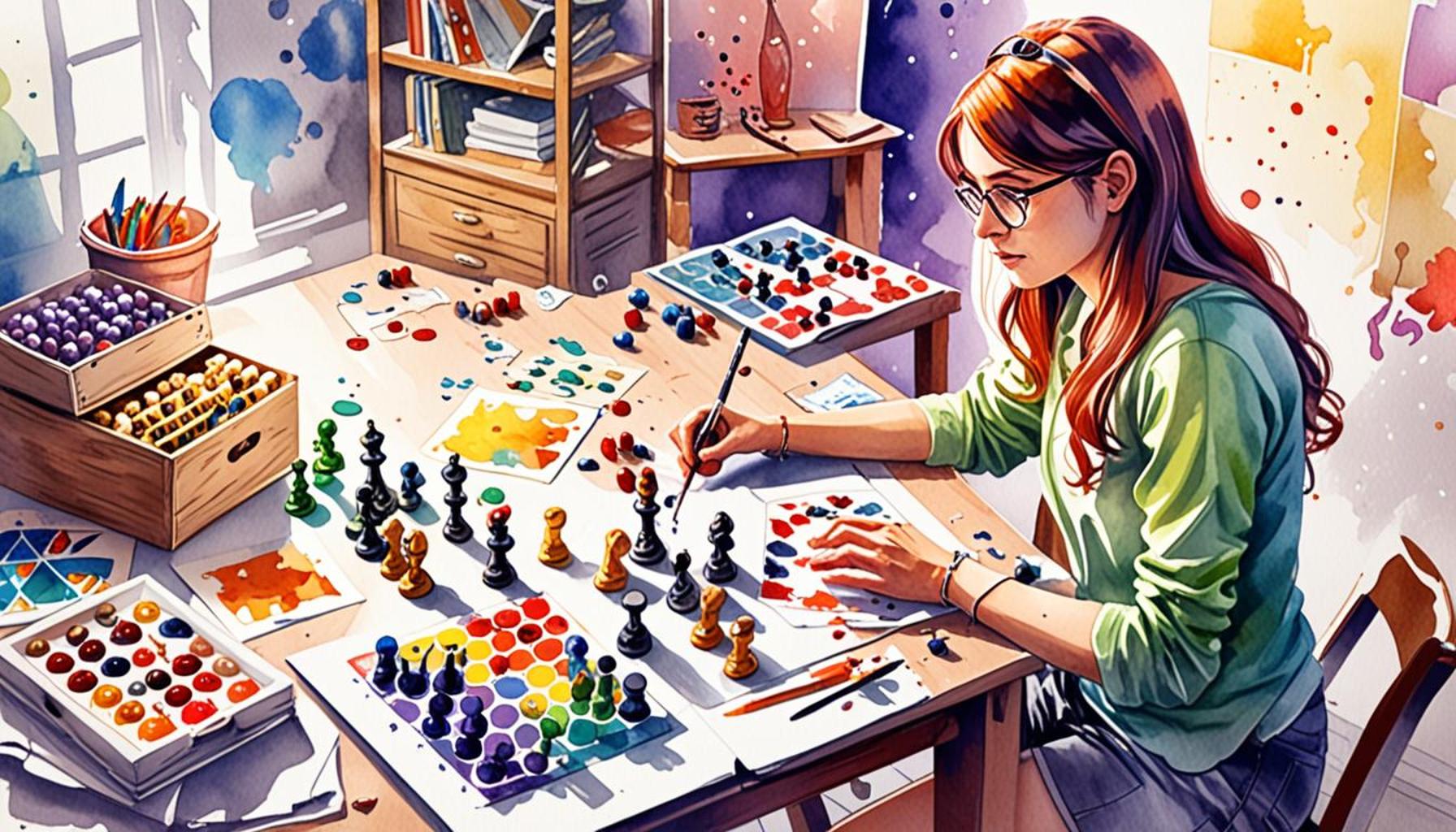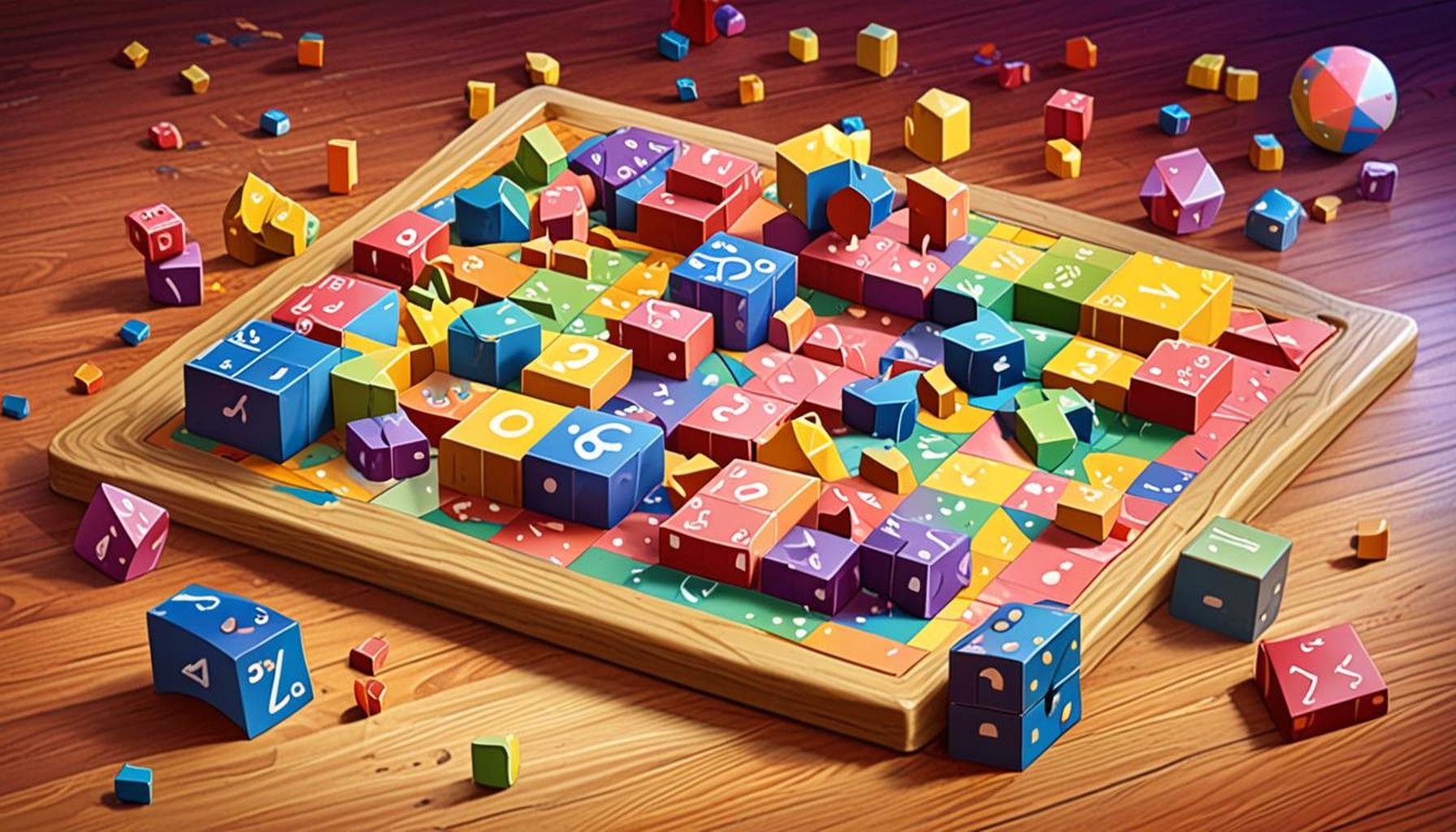How Strategy Games Help Develop Critical Thinking in Young Adults

The Role of Strategy Games in Cognitive Development
In an era buzzing with digital distractions, strategy games have emerged as unexpected tools for shaping critical thinking in young adults. These games do more than entertain; they challenge players to analyze situations, plan ahead, and make decisions under pressure. By engaging in complex scenarios that mirror real-life challenges, players can develop valuable skills that transcend the virtual world.
One of the standout features of strategy games is their requirement for complex decision making. Players are often thrust into high-stakes environments where they must assess risks and rewards meticulously. For example, in games like “Civilization VI,” players must consider political alliances and resource management while expanding their empires. The choices made can lead to victory or defeat, closely mirroring the decision-making processes faced in real-world business or political arenas. This immersion in complex scenarios enhances not only analytical skills but also encourages players to think critically and anticipate the consequences of their actions.
Strategic planning is another essential skill developed through these games. Players who engage in long-term strategies learn to think several steps ahead, refining their foresight and patience. For instance, in “StarCraft II,” players must devise intricate plans that adapt to their opponents’ tactics. This ongoing evaluation and use of foresight teach players the importance of adaptability in achieving long-term goals, a skill highly sought after in today’s fast-paced job market.
Moreover, the problem-solving skills honed through these challenges are invaluable. As players encounter and try to overcome obstacles, they strengthen their analytical abilities, which are crucial not only in gaming but also in academic and professional settings. Games like “Portal” require players to solve a series of puzzles that necessitate creative thinking and logical reasoning. The iterative nature of encountering a barrier and devising new methods to surpass it fosters resilience and innovation.
Furthermore, studies indicate that engagement with strategy games fosters qualities that are highly valued in contemporary society, such as collaboration and adaptability. Many modern strategy games involve multiplayer features, requiring players to cooperate with others to succeed. This dynamic encourages teamwork and communication, essential soft skills that are critical in today’s collaborative workplaces.

As young adults dive into diverse narratives and challenges set forth by these games, they cultivate a mindset focused on innovation and critical assessment. The immersive experience of strategizing and adapting to an evolving game world empowers them to tackle real-life complexities with greater confidence.
Ultimately, strategy games offer a captivating platform for young minds to explore the intricate dynamics of decision-making while having fun. This unique blend of entertainment and education invites players to develop skills that directly contribute to their intellectual growth in various fields. Consequently, as we immerse ourselves in these digital battlefields, we find not just entertainment but a rich soil in which critical thinkers can thrive.
DISCOVER MORE: Click here to delve deeper
Unpacking the Cognitive Benefits of Strategy Games
The intricate world of strategy games offers a multitude of cognitive advantages that resonate significantly with young adults seeking to sharpen their critical thinking skills. These games encourage players to engage in adaptive reasoning that can have considerable implications for their personal and professional lives. As young individuals navigate through these virtual realms, they not only sharpen their intellect but also enhance their key cognitive competencies.
One of the primary cognitive benefits of playing strategy games is the development of analytical skills. Players encounter multifaceted problems that require them to dissect components, evaluate options, and formulate optimal solutions. A fine example of this is the highly strategic game “Age of Empires.” In this game, players need to strategize resource allocation while simultaneously planning military tactics to outmaneuver opponents. The necessity to analyze the strengths and weaknesses of different civilizations cultivates a mindset rooted in analysis, essential for success in any problem-solving scenario.
Furthermore, these games actively promote creative thinking. The scenarios presented often demand out-of-the-box strategies that push players to think beyond conventional norms. For instance, “XCOM: Enemy Unknown” requires players to develop innovative tactics in a turn-based combat environment, where failure to adapt could lead to devastating consequences. This game not only stresses logical reasoning but also compels players to be inventive, as they must devise new approaches to counter challenging adversaries.
Another noteworthy element is the enhancement of decision-making under pressure. In many strategy games, situations can change at a moment’s notice, necessitating quick assessment and rapid decision-making skills. Titles such as “Total War: Three Kingdoms” put players in positions where they must make swift choices that can lead to significant in-game outcomes. This ability to make effective decisions under time constraints can translate seamlessly to real-world scenarios, such as managing projects or navigating unexpected challenges in the workplace.
- Enhanced Analytical Skills: Players dissect various situations to evaluate options systematically.
- Creative Problem Solving: Unique challenges require innovative tactics and strategies.
- Rapid Decision-Making: Players learn to make effective decisions under pressure.
Moreover, the nature of strategy games emphasizes self-evaluation and reflection, essential components of critical thinking. Players often review their past decisions, celebrating victories while analyzing failures to improve future performance. This reflective practice cultivates a growth mindset, encouraging players to understand that mistakes are part of the learning process. Such self-assessment fosters resilience and adaptability, traits that are crucial in a rapidly changing world.
As young adults immerse themselves in these challenging environments, they become not only adept players but also capable thinkers who are well-prepared to tackle the complexities of modern life. The cognitive skills developed through strategy gaming lay a strong foundation, facilitating their transition into various fields of interest, from business to creative industries. Ultimately, strategy games serve as engaging platforms for cognitive development, creating critical thinkers ready to innovate and lead in their respective spheres.
How Strategy Games Enhance Critical Thinking Skills
Strategy games serve as an engaging platform for young adults to sharpen their critical thinking skills in extraordinary ways. These games often create complex scenarios where players must evaluate multiple variables and make decisions that will influence the game’s outcome. For instance, in games like Chess or StarCraft, players develop the ability to foresee potential consequences based on their choices. This aspect of strategic thinking can translate to real-world situations, where young adults are often required to make quick, informed decisions under pressure.Additionally, strategy games are designed to encourage players to analyze their opponents’ moves and adjust their tactics accordingly. This necessity for adaptability cultivates a mindset that is not only flexible but also highly analytical. Young adults learn to sift through information, recognize patterns, and anticipate future developments, all of which are pivotal skills in today’s fast-paced environment.Moreover, the element of teamwork in many strategy games fosters collaboration, promoting communication and negotiation skills. In cooperative games, players must share information and devise strategies collectively, nurturing an environment where critical thinking flourishes. They learn to articulate their ideas clearly and listen to differing viewpoints, skills that are essential both academically and professionally.In summary, the multifaceted challenges presented in strategy games are not merely entertainment; they are powerful tools for enhancing critical thinking. Players emerge better equipped to navigate complexities, making these games an invaluable asset in personal development.
| Cognitive Development | Strategic Thinking |
|---|---|
| Enhanced decision-making capabilities | Ability to anticipate outcomes based on strategic choices |
| Improved problem-solving skills | Analysis of opponents’ strategies, fostering adaptability |
These attributes collectively demonstrate how strategic gaming is not only a pastime but a profound educational tool that molds future leaders and critical thinkers. Engaging with these games can set young adults on a path towards mastering essential cognitive skills that are pivotal for success in a rapidly evolving world.
Dive deeper: Click here to discover cultural memory strategies
The Social Dynamics of Strategy Games and Their Impact on Critical Thinking
In addition to individualized cognitive development, strategy games also offer an important arena for enhancing collaborative and social skills. Multiplayer strategy games, such as “Civilization VI,” require players to work together and communicate effectively to achieve common objectives. This collaborative environment fosters social interaction, encouraging young adults to articulate their ideas and negotiate decisions with others. By honing their communication abilities, players learn the significance of diverse perspectives and the art of compromise—both vital components in the realm of critical thinking.
Furthermore, these games often simulate real-world scenarios that hold strategic, economic, and socio-political implications. By engaging with these complex systems, players develop a deeper understanding of how their decisions impact not only their own outcomes but also the collective experience of all participants. Games like “StarCraft II” illustrate the intricate balance between offense and defense, where a player’s actions can drastically alter the game landscape. Here, players are prompted not only to think critically about their strategy but also to consider the broader ramifications of their choices in a shared environment.
As young adults face the dynamics of teamwork and collaboration, they also nurture their leadership qualities. Leading a faction in a game requires a player to inspire confidence among teammates while strategically directing their efforts toward common goals. “Dota 2” serves as an exemplary case where strong leadership can pivot a game’s outcome. In such scenarios, players must make tactical decisions while motivating their teams, illustrating the significant role of effective leadership in empowering others. The skills learned through this gameplay have a direct correlation with growth in professional environments, where effective leadership is paramount.
Research supports the idea that engaging in strategy gaming may have long-term benefits beyond immediate cognitive gains. A study conducted at the University of California, Irvine, found that individuals who participated in strategic gaming were better equipped to handle complexity in real-life situations. The problem-solving techniques and innovative thinking strategies developed in a game can lead to enhanced real-world application, proving that the skills acquired through gaming extend far beyond the digital screen.
- Enhanced Collaboration: Multiplayer environments foster teamwork and negotiation skills.
- Understanding Complex Systems: Players learn to navigate and influence the consequences of their decisions.
- Leadership Development: Leading teams within games builds confidence and enhances leadership capabilities.
- Real-World Application: Skills learned in strategy games translate into problem-solving abilities in everyday challenges.
The complexity imbued within strategy games often serves as a microcosm of real-life scenarios, allowing players to experiment with different strategies and outcomes without significant risk. This safety net enables young adults to navigate their decision-making processes, solidifying their critical thinking skills. Whether it’s managing resources, handling conflicts, or exploring innovative approaches to challenges, players are equipped with a diverse toolkit for future problem-solving endeavors.
As the landscape of strategy gaming continues to evolve with advancements in technology and storytelling, the potential for fostering critical thinking in young adults remains an exciting frontier. With each game played, the lessons learned extend beyond the virtual realm, preparing individuals to meet the demands of an increasingly complex world.
DISCOVER MORE: Click here to dive deeper
Conclusion: The Lasting Impact of Strategy Games on Critical Thinking Development
In summary, the multifaceted nature of strategy games offers young adults a unique platform for enhancing their critical thinking skills. By encouraging players to navigate complex scenarios, make strategic decisions, and engage in collaborative gameplay, these games act as a breeding ground for cognitive development. As demonstrated, the benefits extend well beyond the gaming realm; the skills honed in these virtual environments translate into real-world capabilities that are highly valuable in professional and personal contexts.
Moreover, the collaborative dynamics observed in multiplayer strategy games not only foster effective teamwork but also encourage the cultivation of essential leadership qualities. Young adults learn to advocate for their ideas while valuing the input of others, nurturing a culture of cooperation and respect that is crucial as they prepare to enter an increasingly interconnected world. As players analyze repercussions stemming from their choices within these games, they become more adept at tackling real-life challenges with an informed and analytical mindset.
As we move towards a future that emphasizes critical thinking and problem-solving, the integration of strategy games into educational and developmental programs could serve as an effective tool for fostering these essential skills. The intersection of technology, collaboration, and strategy presents an exciting opportunity, underscoring the importance of recognizing how leisure activities can significantly enrich cognitive development. Embracing this potential can empower young adults not only in the realm of gaming but also in the vast opportunities that lie ahead in their personal and professional lives.


